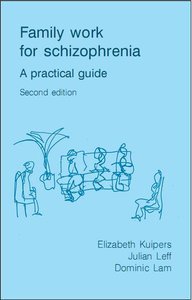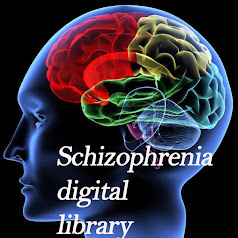
Elizabeth Kuipers,Julian Leff,Dominic Lam,Family Work for Schizophrenia A Practical Guide,Second edition,First published 1992
This edition published 2002,Printed in Great Britain by Bell & Bain Limited, Glasgow,GASKELL
Comentario:
Contents:
Acknowledgements x
Part I. Introduction
1 Introduction to our approach 3
What are the emotions measured by EE? · Low-EE relatives and the
importance of warmth · Low-EE relatives are not simply
neutral · Targeting interventions · The treatment model · Differences
between our approach to work with families and that of others · General
interpersonal effectiveness · Support group for therapists · Summary
Part II. Practical issues in family work
2 Engaging the family 13
Strategies · Families who refuse · Maintaining families
in treatment · Summary
3 Being a therapist, not a guest 18
Social pressures · Forms of address · Greeting and parting · Turning
off the television · Tea and biscuits · Personal questions · Taking
control · Summary
4 Co-therapy 22
Modelling · Trust · Forming alliances · Working on separate
tasks · Planning sessions · Support during the
session · Debriefing · Summary
5 Offering education 26
The education programme · The long-term process of education · The
main topics · Summary
6 Family sessions 30
Aims · Achieving the aims · Briefing and debriefing · Summary
7 Improving communication 33
The problems · Establishing the ground rules · Listening
skills · Summary
8 Task setting 36
Setting a realistic list of goals · Setting an agenda and
prioritising · Negotiating solutions and agreeing on
homework · Checking up on homework · Summary
v
vi Contents
9 Dealing with emotional upset: general issues 44
The variety of emotional responses · Normalising emotional
responses · Positive reframing · Seeing family members
separately · The use of relatives’ groups and role play · Summary
10 How families affect professionals 49
The spread of conflict · Doom and gloom · Guilt and
anger · Summary
11 Leaving 52
Establishing a lifeline · Reviewing the family work · Summary
Part III. Emotional issues, problems of individuals and groups
12 Anger, conflict, rejection 57
Defusing anger · Keeping control · Model positive negotiation · Look
at the positive aspects · Limit setting · Unpacking a violent incident
within the family · Prevention · Summary
13 Dealing with overinvolvement 63
General considerations · Relative’s guilt · Finding a lever · Exploring
anxieties about separation · Replacing the role of carer · Limit
setting · Achieving independence · Strategic moves · Summary
14 Grief 72
Summary
15 The vulnerability of adult patients 74
Sexuality · Social competence · Summary
16 Stigma 78
Intervention · Summary
17 Absent family members 82
How to get everyone in the family involved · Involving the ‘peripheral’
family network for support · Coping with non-attendance · Coping
with lack of interest in meetings · Summary
18 Helping marital families 87
Task sharing · Loss of a confidante · Re-establishing a warm
relationship · Sexuality · Separation · Summary
19 Children in the household 92
Timing of parents’ marriage · Exposure of the child to
symptoms · Factors influencing the child’s response to a parent with
schizophrenia · Specific problems · Summary
20 Carers who are siblings or children 97
Siblings · Children · Summary
21 Employment 101
Helping patients to gain outside employment or return to
education · Preparation of patients · Summary
22 Cultural issues 105
Language · Ethnic matching of therapists with clients · Family
structure · Maintaining ‘face’ · Beliefs about the causes and treatment
of illness · The advantages · Summary
Contents vii
23 Special problems complicating family work 109
Alcohol and substance misuse · Child physical and sexual
abuse · Suicide · Physical disabilities · More than one person in the
family with schizophrenia · Working with several other
agencies · Families who reject therapists · Summary
24 Running a relatives’ group. I 118
Advantages of relatives’ groups · Disadvantages of relatives’
groups · General issues · Venue · Timing · Selection · Size · Open
or closed groups? · Aims of a relatives’ group · Therapists’
role · Summary
25 Running a relatives’ group. II 124
The first group meeting · Subsequent meetings · Themes · Problem
solving · Emotional processing · Maintaining attendance · Ending a
group · Summary
Part IV. Conclusion
26 Conclusion 133
Effect of education · Effect of family sessions
Bibliography 136
Appendix 1. Education booklet 138
Appendix 2. Helpful Aspects of Therapy form 148

Publicar un comentario